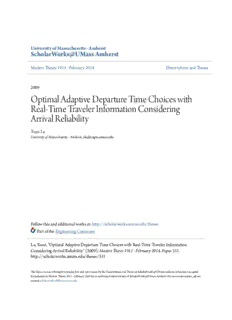
Optimal Adaptive Departure Time Choices with Real-Time Traveler Information Considering Arrival ... PDF
Preview Optimal Adaptive Departure Time Choices with Real-Time Traveler Information Considering Arrival ...
UUnniivveerrssiittyy ooff MMaassssaacchhuusseettttss AAmmhheerrsstt SScchhoollaarrWWoorrkkss@@UUMMaassss AAmmhheerrsstt Masters Theses 1911 - February 2014 2009 OOppttiimmaall AAddaappttiivvee DDeeppaarrttuurree TTiimmee CChhooiicceess wwiitthh RReeaall--TTiimmee TTrraavveelleerr IInnffoorrmmaattiioonn CCoonnssiiddeerriinngg AArrrriivvaall RReelliiaabbiilliittyy Xuan Lu University of Massachusetts Amherst Follow this and additional works at: https://scholarworks.umass.edu/theses Part of the Engineering Commons Lu, Xuan, "Optimal Adaptive Departure Time Choices with Real-Time Traveler Information Considering Arrival Reliability" (2009). Masters Theses 1911 - February 2014. 311. Retrieved from https://scholarworks.umass.edu/theses/311 This thesis is brought to you for free and open access by ScholarWorks@UMass Amherst. It has been accepted for inclusion in Masters Theses 1911 - February 2014 by an authorized administrator of ScholarWorks@UMass Amherst. For more information, please contact [email protected]. OPTIMAL ADAPTIVE DEPARTURE TIME CHOICES WITH REAL-TIME TRAVELER INFORMATION CONSIDERING ARRIVAL RELIABILITY A Thesis Presented by XUAN LU Submitted to the Graduate School of the University of Massachusetts Amherst in partial fulfillment of the requirements for the degree of MASTER OF SCIENCE IN CIVIL ENGINEERING September 2009 ©Copyright by Xuan Lu 2009 September OPTIMAL ADAPTIVE DEPARTURE TIME CHOICES WITH REAL-TIME TRAVELER INFORMATION CONSIDERING ARRIVAL RELIABILITY A Thesis Presented by XUAN LU Approved as to style and content by: _______________________________ Song Gao, Chair _______________________________ John Collura, Member _______________________________ Daiheng Ni, Member _______________________________ Richard N. Palmer, Department Head Civil and Environmental Engineering ACKNOWLEDGMENTS This thesis, and my graduate study at The University of Massachusetts Amherst, have benefited greatly from the guidance of my advisor, Dr. Song Gao. I also want to thank my parents for supporting me through my whole lifetime. Moreover, the author is indebted to the University of Massachusetts (UMass) Amherst, and the Department of Civil and Environmental Engineering and the School of Engineering at UMass Amherst for funding the research. iv OPTIMAL ADAPTIVE DEPARTURE TIME CHOICES WITH REAL-TIME TRAVELER INFORMATION CONSIDERING ARRIVAL RELIABILITY XUAN LU, B.S., TSINGHUA UNIVERSITY M.S., UNIVERSITY OF MASSACHUSETTS AMHERST SEPTEMBER 2009 Directed by: Professor Song Gao ABSTRACT When faced with an uncertain network, travelers adjust departure time as well as route choices in response to real-time traveler information. Previous studies on algorithm design focus on adaptive route choices and cannot model adaptive departure time choices (DTC). In this thesis, the optimal adaptive departure time and route choice problem in a stochastic time-dependent network is studied. Travelers are assumed to minimize expected generalized cost which is the sum of expected travel cost and arrival delay costs. The uncertain network is modeled by jointly distributed random travel time variables for all links at all time periods. Real- time traveler information reveals realized link travel times and thus reduces uncertainties in the network. v The adaptive departure time and route choice process is conceptualized as a routing policy, defined as a decision rule that specifies what node to take next at each decision node based on realized link travel times and the current time. Waiting at origin nodes is allowed to model DTCs that are dependent on traveler information. Departure time is a random variable rather than fixed as in previous studies. A new concept of action time is introduced, which is the time-of-day when a traveler starts the DTC decision process. Because of the efforts involved in processing information and making decisions, a cost could be associated with a departure made after the action time. An algorithm is designed to compute the minimum expected generalized cost routing policy and the corresponding optimal action time, from all origins to a destination for a given desired arrival time window. Computational tests are carried out on a hypothetical network and randomly generated networks. It is shown that adaptive DTCs lead to less expected generalized cost than fixed DTCs do. The benefit of adaptive DTC is larger when the variance of the travel time increases. The departure time distribution is more concentrated with a larger unit cost of departure delay. A wider arrival time window leads to a more dispersed departure time distribution, when there is no departure penalty. Key Words: Adaptive, Departure time choice, Real-time travel information vi TABLE OF CONTENTS Page ACKNOWLEDGMENTS ..................................................................................................... iv ABSTRCT ............................................................................................................................... iv LIST OF TABLES ................................................................................................................... ix LIST OF FIGURES .................................................................................................................. x CHAPTER 1 INTRODUCTION…………………………………………………………………...1 1.1 Motivation ................................................................................................................ 1 1.2 Organization ............................................................................................................ 3 2 LITERATURE REVIEW ................................................................................................. 4 2.1 Introduction ............................................................................................................. 4 2.2 Departure Time Choice Model .............................................................................. 4 2.3 Reliable Routing Problem ...................................................................................... 8 2.3.1 Routing Algorithm considering Reliability .................................................. 9 2.3.2 Reliable Route Choices with Information Access...................................... 10 2.4 Contributions ......................................................................................................... 11 3 ALGORITHM DOT-REL ............................................................................................. 12 3.1 Problem Definition ................................................................................................ 12 3.1.1 Network ........................................................................................................... 12 3.1.2 Routing Policy ................................................................................................ 13 3.1.3 Adaptive vs. Fixed DTC ................................................................................ 16 vii 3.2 Algorithm Design .................................................................................................. 22 3.2.1 The Optimality Condition ............................................................................ 22 3.2.2 Algorithm with Perfect Online Information .............................................. 24 4 COMPUTATIONAL TESTS ........................................................................................ 30 4.1 Objective ................................................................................................................. 30 4.2 Computational Test Design ................................................................................. 30 4.3 A Hypothetic Network ......................................................................................... 33 4.4 Random Networks ................................................................................................ 37 5 CONCLUSIONS AND FUTURE DIRECTIONS ...................................................... 45 APPENDIX: AN ILLUSTRATIVE EXAMPLE FOR ALGORITHM DOT-REL ........... 47 REFERENCES ....................................................................................................................... 51 viii LIST OF TABLES Table Page 3-1 Results from Adaptive DTC vs. Fixed DTC.............................................................. 22 A-1 Results at t=2 and t=1................................................................................................... 49 ix
Description: